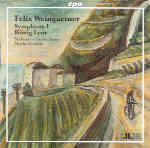Only three years’ Mahler’s junior, Felix Weingartner (1863-1942) writes like a member of the older generation, but that’s not a bad thing at all given the results on display here. This is delightful music. King Lear sounds a bit tame, and for all its programmatic specificity could be about anything at all (though there is an effective storm scene); but it’s surprisingly well constructed along Lisztian lines and it wears its 22 minutes lightly.
The symphony is better still. It sounds like the love child of Beethoven’s Sixth and Seventh, with a freshness and innocence that recalls a work that Weingartner later premiered (in 1935) but could not possibly have known in 1898 because it hadn’t yet been discovered: Bizet’s Symphony in C. In both symphonies you find good tunes, a strict approach to established forms, and charming orchestration with especially perky wind writing. If Weingartner had had the courage to add triangle and tambourine to the finale’s second subject, you might mistake it for something by Borodin or Balakirev.
Conservative or not, this is just plain lovable music. The performances are very good, a bit cautious sounding in King Lear and in the first movement of the Symphony, but well played and well recorded. I could do with less back-channel ambience in multi-channel format, however. If Weingartner keeps up this level of quality in future releases (this is Volume 1 of a projected series), we may have another first-rate composer who also happened to conduct (rather than the other way around) on our hands.
































